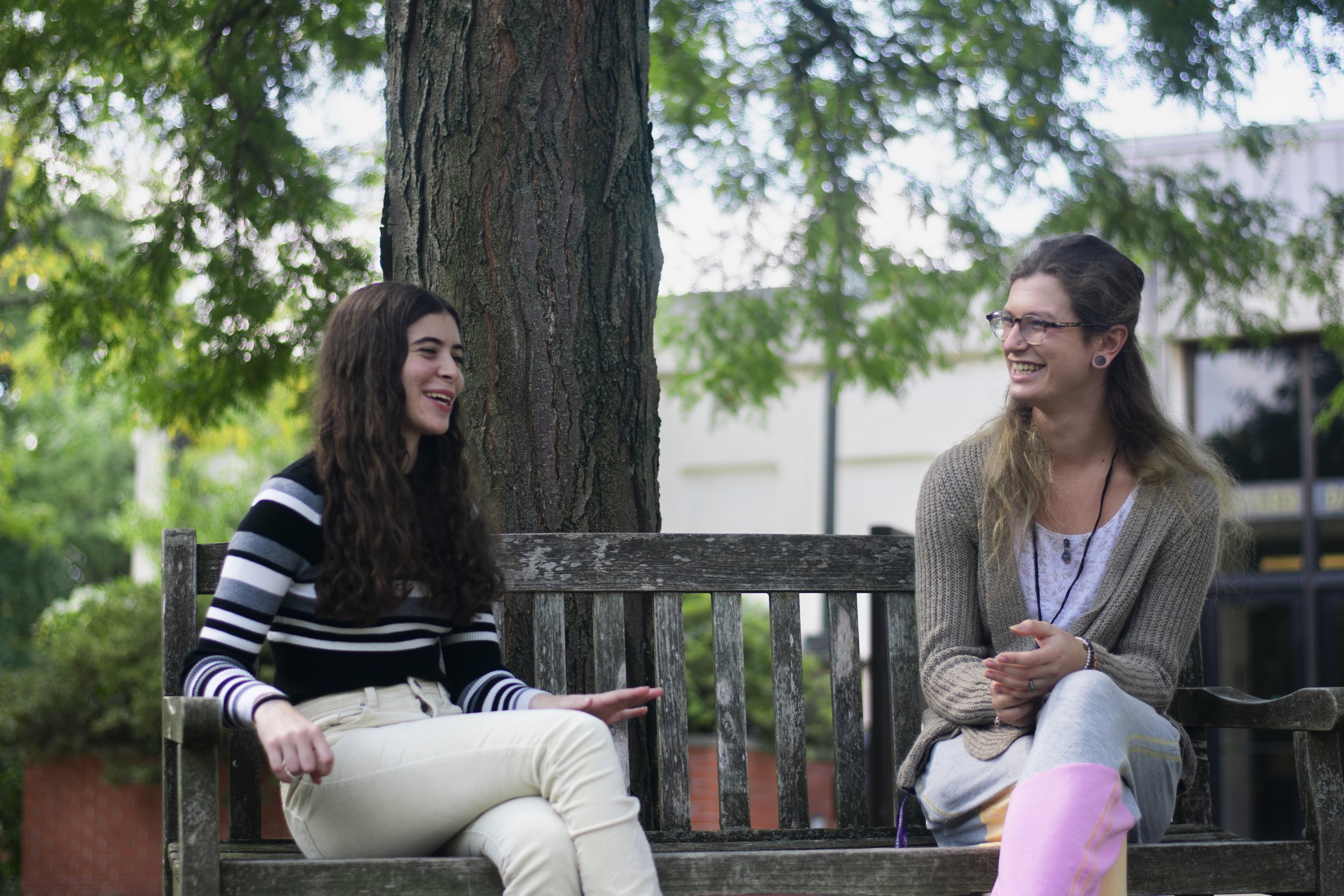Student Success Coaches Make a Difference
This article was originally published in the Winter 2022 edition of the Chatham Recorder Alumni Magazine. To view more digital Recorder stories, click here.
“I honestly thought that the SDE course was super unique because it’s kind of like having a cheat code to college.”
When Sydney Wander ’24 first got to Chatham, she felt different from her peers. “I have a five-year-old brother and an eight-year-old sister, so they were just starting second grade and pre-school,” she says. “I didn’t want to miss a lot of that, so I was going home a lot while a lot of my peers seemed to be going to parties more. I was worried about maybe not fitting in as much because I was a little bit different.”
Chrisitne Worms ’25 and her Success Coach, Stella Scott, PsyD ’25
“But Stephenie really helped me with that,” Wander continues. “She taught me that having different priorities can be advantageous, that it doesn’t have to be a harmful thing and that was very helpful to me.”
The woman who helped Wander so much is Stephenie Spencer, Doctor of Psychology in Counseling Psychology (PsyD) ’25. Spencer is a Chatham Student Success Coach, a program that’s a collaboration between Chatham’s Office of Student Affairs and graduate counseling psychology programs. According to Vice President of Student Affairs and Dean of Students Chris Purcell, its twin goals are to increase student retention and to meet the needs of a diverse student population. And if the numbers are anything to go by, it’s working.
“We’re really proud of our first-to-second semester persistence rate for last year, with 93% of our entering class remaining at Chatham for their second semester,” says Purcell. “Having some of our best persistence numbers in the last five years with our largest-ever entering class was really encouraging for us. And we’re all crossing our fingers to see our first-to-second year retention rate this fall. We’re thinking that’s going to be one of Chatham’s best in some time as well.”
Strategies for Success in college
The Student Success Coaches program works hand-in-hand with a one-credit course called SDE 101: Strategies for Success in College. SDE, as it’s known, meets for 50 minutes one day per week and is team taught by a Success Coach and a Chatham professional staff member. Topics include time and stress management, diversity, equity and inclusion, and different types of resources available to students, both at Chatham and across the City of Pittsburgh.
“I honestly thought that the SDE course was super unique because it’s kind of like having a cheat code to college. You have your professors and success coach, and they’re giving you these life hacks, and how to navigate your first weeks at college,” says Christine Worms ’25. “One really cool exercise we did was we all had to go into groups and make lists of things to do outside of the University, in the City of Pittsburgh,” she says. “And I remember somebody mentioned the Carnegie Museum of Natural History, and I had never even heard of it, but I went with a friend, and we had a really amazing time.”
Sydney Wander ’24 and Success Coach Stephanie Spencer, PsyD ’25
Each Success Coach arranges to meet with each of his or her 25 to 35 SDE students two times outside the classroom—to get to know each other, talk about how things are going, that sort of thing. The goal is to establish a relationship so the student will feel more comfortable talking to the Success Coach about anything that is bothering them, and the Success Coach can help match the student with resources to help—anything from counseling at the counseling center to academic help at the Office of Academic and Accessibility Resources to invites to events. Students are free to reach out to Success Coaches at any time, and many of them do.
Nothing’s off the table when it comes to discussions with your Success Coach, but some topics come up more than others. “Roommates! That’s the top topic. Definitely roommates,” says Student Success Coach Talia Abreu Sterling, PsyD ’25. “And the adjustment of leaving your family and trying to figure out what ‘family’ looks like at this point. For some people, having space gave them the chance to reevaluate what their family dynamic looked like, and whether that was healthy for them or not. For some, leaving family was just the typical ‘I just miss my family so much, I want to go home, or I don’t feel like I have a family here on campus.’ People had such different reactions to being away from their family, and that came up a lot in our one-on-ones.”
Game changing program
Success Coach Talia Abreu Sterling, PsyD ’25 talks with one of her students, Trinity Antonio ’25
Success Coaches receive six credits of tuition remission and a small stipend. “The Student Success Coach program was such a big influence on my decision to attend Chatham,” says Abreu Sterling. “I learned so much, and I feel like the students I connected with know they have someone on their side throughout their journey, and that’s really important to me as well.”
“There are many more of these sorts of hybrid counseling centers and success coach type positions popping up in higher education, while a lot of other Student Affairs positions shrink and go away,” says Purcell. “I’ve seen a couple of our Success Coach alums springboard this experience into a career in higher ed, because they have this kind of experience on top of their PsyD or their Masters of Science in Counseling Psychology.”
“The impact of the program on grad psych has been game changing. It has offered us the opportunity to recruit strong students at both the masters and doctoral levels and has given them unique training and experience in working with the college student population,” says Mary Jo Loughran, Ph.D., professor of counseling psychology.
Invaluable resources
Success Coaches aren’t expected to be bona-fide counselors or have all the answers. “It’s just been a really cool way, as a first-year student, to kind of be in the same boat as them,” says Spencer. “And we’re all learning Chatham together, but that made it that much more fun and that much more special. I loved the class that I taught and the students in that class. I’m really looking forward to meeting my new set of students this year.”
Isabella Vincent ’25
“The faculty that work with the Success Coach team and the Office of Student Affairs are just phenomenal,” says Abreu Sterling. “They are invaluable resources when it comes to helping these students.”
Isabella Vincent ’25, lived off campus during her first term. Because of that, she found it hard to get involved in events on campus. Until, that is, Abreu Sterling stepped in. “Talia introduced the BIPOC (Black and Indigenous People of Color) family dinner to me, hosted by the Office of Diversity and Inclusion (ODEI), and that’s how I met some of my closest friends to this day. It’s a monthly dinner open to people of color. She also e-mails me about a lot of events that are going on and got me involved in a lot of different clubs and organizations on campus. The SDE class was the reason I kind of came on campus—every class, they would tell us about events that were happening on campus, and I felt like I was missing out on some of those events,” says Vincent. “I moved on campus, and I’ve never looked back.”
“The faculty that work with the Success Coach team and the Office of Student Affairs are just phenomenal. They are invaluable resources when it comes to helping these students.”




